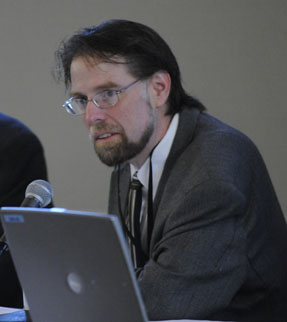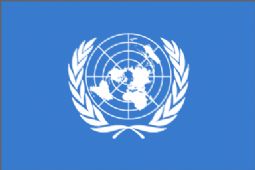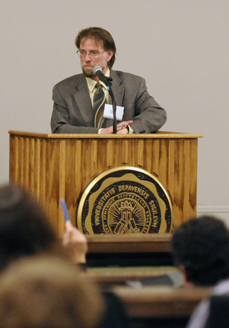Prof. Brett O'Bannon Invited to Address UN-Sponsored Conference on West Africa
September 8, 2009

In preparation for December's United Nations Climate Change Conference in Copenhagen(COP 15), next week's regional conference will "seek a joint position of West African states on ways to best address current and future issues relating to the protection of civilians in the context of climate change," according to Ludovic de Lys, regional director of the OCHA (UN Office for the Coordination of Humanitarian Affairs) Regional Office for West Africa.
The letter from de Lys to David Harvey, vice president for academic affairs at DePauw, adds, "In pursuance to the excellent collaboration between our regional office and DePauw and considering the crucial understanding that your University has made to the understanding of the herders/farmers conflict in the Sahel through the work of Professor O'Bannon, I wish to invite DePauw University to participate in the subject  conference and to be a part of a panel discussion on climate change, conflict prevention and recovery in West Africa."
conference and to be a part of a panel discussion on climate change, conflict prevention and recovery in West Africa."
"For me, of course, it is a great honor, one of the greatest of my life, frankly, to be asked to advise as a member of a panel of experts such an organization on such an important topic," says Dr. O'Bannon. "As the government ministers of these countries well understand, the severely negative effects of climate change do and will continue to disproportionately affect the poorest countries with the least capability to adapt to the ever worsening context."
According to the professor, "One of the great sticking points in achieving a more effective global response to climate change is the question of how much of the economic burden of responding to climate change (i.e. reducing carbon footprints, etc.) should be borne by richer countries and how much should less developed countries should be responsible for shouldering some of the current costs of adaptation. That will no doubt remain a tricky issue, but what should be made perfectly clear at Copenhagen is that countries like those in West Africa, and the African Sahel (one of the most sensitive ecosystems in the world) are already paying a much heavier
As O'Bannon sees it, "The Darfur conflict has occurred, in large measure, because the land beneath the feet of herders and farmers --people who have co-existed for ages in an often symbiotic relationship -- failed. This increase in resource scarcity helped transform a relationship of co-existence into genocidal competition for life-sustaining resources. Of course each conflict is more complicated than the result of one cause, and the government in Khartoum's responsibility in this genocide should not be overshadowed by these structural matters, but the stark reality is that only more of this is to come."
Solutions to such problems are far from obvious, the DePauw political scientist says. "My presentation will discuss the results of my research on West African herders and farmers and their efforts to establish local institutions of conflict management under changing political and economic 'climates.' I will explore things like what explains how a relatively small incident in the spring of 1989, in which a group of Senegalese youth guarding a cornfield chased Mauritanian herders off and back across the border where four of them were shot, which nearly led to war between these two countries who are important development partners. I will also -- and perhaps this is the trickiest part -- discuss how political and economic changes impact these interrelationships. This is important, I think, because adaptation to climate change will require economic and political policy responses, and these invariably impact -- for better or worse -- herder-farmer relations. That's why the sensitivity of herder-farmer relations to these kind of changes in their socio-economic, political and physical environmental makes the observation of herder-farmer relations such a useful conflict early-warning system. Monitoring these relationships taps into changes that are hard to observe and thus do not appear in the newspaper or intelligence briefings until the conflict has already, well, made the news."
part -- discuss how political and economic changes impact these interrelationships. This is important, I think, because adaptation to climate change will require economic and political policy responses, and these invariably impact -- for better or worse -- herder-farmer relations. That's why the sensitivity of herder-farmer relations to these kind of changes in their socio-economic, political and physical environmental makes the observation of herder-farmer relations such a useful conflict early-warning system. Monitoring these relationships taps into changes that are hard to observe and thus do not appear in the newspaper or intelligence briefings until the conflict has already, well, made the news."
DePauw's Janet Prindle Institute for Ethics, in collaboration with OCHA, hosted a Humanitarian Intervention Symposium, March 5-7, 2009. Details can be found in this story.
Back